Emma McKeon and the Story Behind Australia’s Most Underrated Star
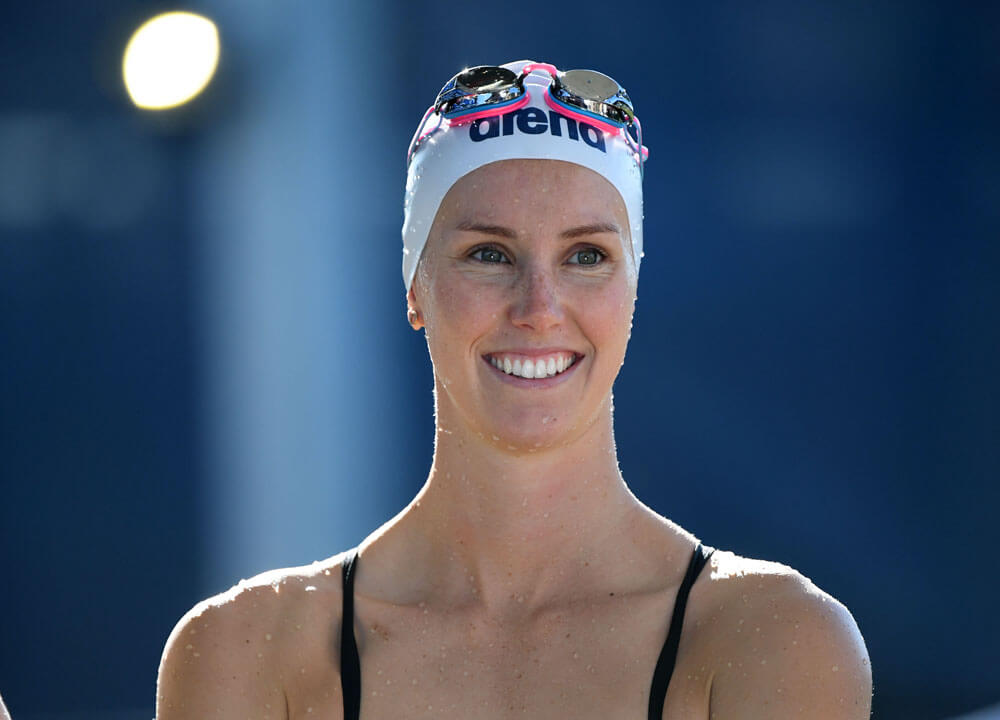
Emma McKeon and the Story Behind Australia’s Most Underrated Star
(From February’s Swimming World Magazine)
After not qualifying for Australia’s Olympic team in 2012, Emma McKeon was ready to quit, but over the next several months, she had a change of heart and understood what was necessary to compete at a higher level. Since then, she has become a significant international force, a consistent podium presence and one of the world’s most impactful relay swimmers.
**********
At Australia’s Olympic Swimming Trials in 2012, Emma McKeon, then 17, finished seventh in the 100 free, one spot away from qualifying for her first Olympics in the 400 free relay. That same week, she watched her older brother, David, win the 400 free and place third in the 200 free to qualify for London.
She was ready to give it all up!
“I was really upset when I missed that team—obviously because my brother made it, and our other training partner, Jarrod Poort, he made it as well in the 1500. I was really upset after that, and then I actually stopped swimming not long after the Trials,” McKeon said. “I knew I wanted to go to the Olympics, but I didn’t want to wait another four years, so I was like, ‘I’ll just stop.’”
But over the next several months, around the time she traveled to London to watch David compete, McKeon began to understand the level of effort necessary in order to qualify for international meets and to become one of the world’s best swimmers. So when she returned to the sport in late 2012, McKeon said, “I guess I just knew that you have to be showing up to training every day and doing everything properly to be able to perform at the level I wanted to perform at.”
And then, less than 12 months after London, McKeon found herself in a key spot on an Australian relay battling for a World Championships title—and she has been in that same central role each year since.
Emma McKeon’s Swimming Family
Speaking of McKeon’s family, her father, Ron, was a two-time Olympian for Australia—in 1980 and 1984—and he won four gold medals at the Commonwealth Games, including gold medals in the 200 and 400 free in 1978. McKeon’s mother, Susie, swam at the Commonwealth Games in 1982, and McKeon’s uncle, Rob Woodhouse, swam at the 1984 and 1988 Olympics for Australia. During her childhood, McKeon grew up constantly around the pool and the beach, and her parents ran a swimming school in Wollongong, New South Wales. So, quite literally, the only life McKeon knows centers around swimming.
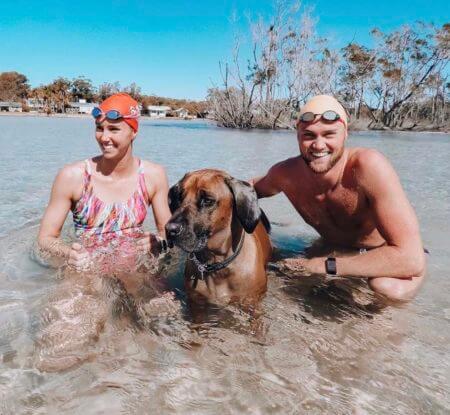
Emma and David McKeon with their dog, Jax — Photo Courtesy: McKeon Family
Ron actually coached both Emma and David through the early parts of their careers, so the family had to find balance between the swimmer-coach and parent-child relationships. But during Emma’s late teenage years, both McKeons decided to move to Queensland to continue training. Putting his ego aside, Ron gave full support to Emma and David making that change.
“I loved having my dad as my coach, but he also wanted the both of us to know what it was like to have a coach that wasn’t your dad. He wanted to let us have that opportunity,” Emma said. “It was hard because it was just what I was so used to, but it was also good for me to grow and also work harder.”
Concurrent with Emma’s success, David became one of Australia’s best in the middle distance events. He qualified for both the 2012 and 2016 Olympics in the 400 free and 800 free relay. He won a Commonwealth Games gold medal in 2014 on the 800 free relay and a silver in the 400 free, and he qualified for the 400 free Olympic final in 2016, finishing seventh. In Rio, David and Emma became the first brother-sister combination to represent Australia in Olympic swimming since John and Ilsa Konrads in 1960. Emma remembers feeling nervous as she watched her brother compete in between her own swims in the 100 fly semifinal and as part of Australia’s 400 free relay.
The two siblings trained in different squads for a time, but both swam in Michael Bohl’s group on the Gold Coast prior to David’s retirement in January. Bohl previously coached three-time Olympic gold medalist Stephanie Rice, and the group now includes Australian standouts Emily Seebohm, Thomas Fraser-Holmes, Georgia Bohl and Taylor McKeown. On the Gold Coast, the McKeon siblings actually live together, and Emma called the dynamic positive and supportive—even if she occasionally wishes for a little more of her own space.
Emma McKeon’s International Success
One year after her near miss in making the 2012 Olympic team, McKeon found herself in a key pressure point on the first day of her first major international meet. Swimming the third leg on the 400 free relay at the 2013 FINA World Championships after sisters Cate and Bronte Campbell, McKeon dove in with the lead and maintained the advantage, splitting 53.19. Australia would end up with the silver medal that day, and McKeon would win two more silver medals at that meet as a prelims relay swimmer.
“I always knew that I perform well on relays, and even before that, all my fastest times in relays were well faster than my PBs,” McKeon said. “I knew I could do a good job being a part of those relays, so I wasn’t nervous to be a part of them. I knew I could contribute quite well.”
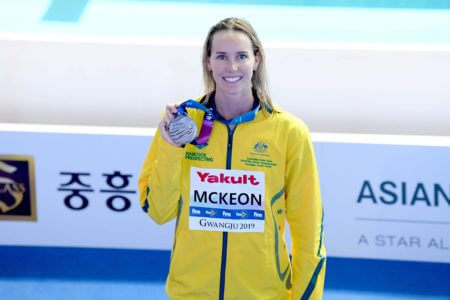
Emma McKeon after winning bronze in the 100 fly at the 2019 FINA World Championships — Photo Courtesy: Delly Carr/Swimming Australia
The first taste of individual success came one year later at the 2014 Commonwealth Games in Glasgow, Scotland. There, McKeon captured gold in the 200 free—her time of 1:55.57 setting an Australian record—and she also won individual bronze medals in the 100 fly and 100 free (behind the Campbell sisters) and helped Australia win gold medals in all three relays to give her a total of six medals. McKeon had the fastest split in the field for the 800 free relay and the fastest fly split in the medley relay, and she set her first world record as part of the 400 free relay team.
“That was my first time swimming at that kind of meet doing individual events. I won a lot of medals there, so I think that’s probably a point where I was like, ‘OK, I’m good at this against the world, with everybody else,’” McKeon said. “I think that was probably a big turning point.”
Two years later, she would qualify for her first Olympics, and in Rio, McKeon won four medals. On the meet’s first night, she led off Australia’s 400 free relay team that would end up winning gold in world-record time. McKeon touched seventh in the 100 fly final, a disappointing result after she ended with the No. 2 qualifying time, but she rebounded in impressive fashion to win bronze in the 200 free, her 1:54.94 setting a lifetime best and placing her behind only the dynamic duo of Katie Ledecky and Sarah Sjostrom. The following day, McKeon split 1:54.64 on Australia’s 800 free relay, vaulting her country into the lead on the way to a silver medal, and she won another silver for her efforts on the 400 medley relay.
In the years since, McKeon has shown remarkable consistency, never winning an individual gold medal on a global level, but placing among the top finishers in both the 200 free and 100 fly at each major international meet. McKeon calls the 100 fly her favorite event, but she considers the 200 free the most stressful for her. “There’s so much more tactic to it. I know exactly how I want to swim it, but just getting it right can be hard at times. I love racing it, but it definitely takes more mind space.”
And every year, McKeon plays a key role on Australia’s free relays—always medal-winners, often gold—and handles the fly leg on medal-winning medley relays. Through many years of handling big moments at significant competitions, McKeon has mastered the mental strategy required to ensure she is always on point.
“I’m a lot more relaxed going into big meets, not overthinking things too much,” she said. “I always hit a point in taper where I’m feeling pretty crappy in the water, and now, I expect that and I know that’s part of it, so I just kind of accept that, don’t really think too much about it. I get nervous in the build-up, but I’m more excited to get it started and just get the week going.”
In 2018, she captured gold at the Commonwealth Games in the 100 fly as part of a six-medal haul, matching for the second time the record for most medals at that meet. In 2019, McKeon had a down performance individually, settling for bronze in the 100 fly and scratching the 200 free, but she led Australia to a gold medal and world record in the 800 free relay, the country’s first win in that event on a global level since 2008. McKeon swam the anchor leg in 1:54.60 to pass American Katie McLaughlin and win gold by 33-hundredths.
Seeing the Big Picture
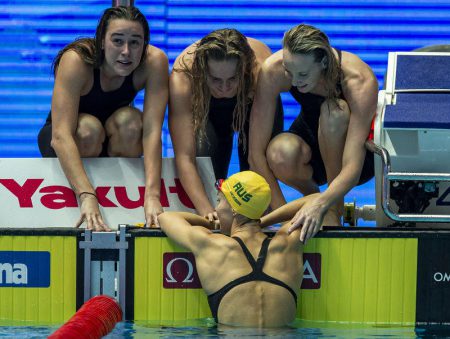
Brianna Throssell, left, Ariarne Titmus and Madison Wilson congratulate Emma McKeon after Australia won gold in the 800 free relay at the 2019 FINA World Championships — Photo Courtesy: Patrick B. Kraemer
Along with her swimming career, McKeon has been working on a bachelor’s in health promotion and public health nutrition since 2014, taking one or two courses each semester. “It’s just been good to have something else away from the pool, even though it hasn’t been much,” McKeon said. “It hasn’t been a huge workload or anything. It’s been quite easy to manage alongside swimming, but it’s just been good to have something else that I’m striving to complete.”
She is nearing completion of that degree, but she doesn’t know how she wants to put it to use in the working world. Just as well—she intends to keep swimming for a while longer, particularly with the ISL offering an exciting new outlet for professional swimmers.
In March 2020, the Tokyo Olympics were postponed one year due to fallout from the COVID-19 global pandemic, and most of the world’s athletes viewed that decision as necessary. But in the leadup to that announcement, McKeon had never allowed herself to consider such a possibility. So focused was McKeon on her goals for the Olympics that when the news came, she found it hard to dial back and relax.
“On the day that it was (postponed), it came as a big shock to me because I was very focused and I didn’t want to think in my head that was going to be canceled and not be putting everything I had into training,” McKeon said. “It also was hard because I couldn’t just switch off randomly one day. I was still very motivated and everything, and I still wanted to keep training, so it was kind of hard to adjust to just taking a break. That took me a few weeks.”
McKeon ended up taking a hiatus of nearly three months, during which she returned to her family home in Wollongong, New South Wales. By July and August, she had returned to a relatively normal training routine, but she couldn’t help but dwell on what might have been happening on those same days if she were in Tokyo at the Olympics.
Once swimming picked up again, McKeon came out of the gates with a bang. While she and most Australians did not compete in the ISL bubble in Budapest, she did record a blistering 52.46 in the 100 free in December at the Queensland State Championships, just 5-hundredths off her personal best and the fastest time in the world for 2020. She also swam a quick 56.69 in the 100 fly and a 24.55 50 free.
Proud of the Past, Prepared for the Future
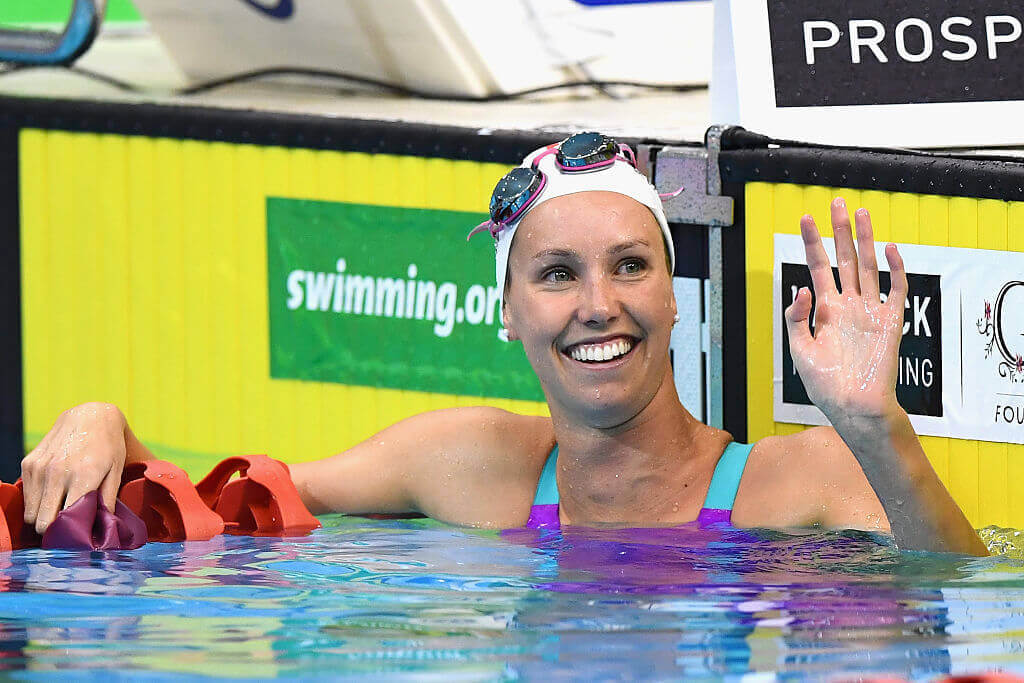
Emma McKeon at the 2018 Australian Swimming Trials — Photo Courtesy: Australian Olympic Committee
This June in Adelaide, McKeon will be competing at the Australian Olympic Swimming Trials in an effort to represent her country at the postponed Tokyo Olympics. Currently, she should be a significant medal threat in all of her events. She ranks eighth all-time in the 200 free (1:54.55), seventh in the 100 fly (56.18) and sixth in the 100 free (52.41), although earning the chance to pursue an individual medal in that event will require beating out either Cate or Bronte Campbell at Trials. She should also continue to be a key to Australia’s gold medal hopes in all three relays.
Earlier in her career, McKeon would follow up a successful performance by looking toward what came next. That go-go-go attitude prevented McKeon, now 26, from stepping back to enjoy her accomplishments and be proud of herself, but more recently, she has achieved some perspective on the magnitude of her accomplishments. “I think as I’ve gotten older, I’ve realized that it’s good to be able to look back on what you’ve done and be proud of it,” she said.
Certainly, McKeon has been overshadowed to some degree, with the likes of the Campbell sisters, Seebohm, Ariarne Titmus and rising backstroker Kaylee McKeown stealing the limelight among Australian women. But every single year, McKeon shows up and performs. Given her talent, her versatility and her clutch abilities on relays, she could very well be carrying the torch for Australia at the 2021 Olympic Games.




what primary and high school did Emma McKeon go to?
hii